Want to become a relationship coach?
You’re in the right place. Today, you’ll learn what a relationship coach is, who can become one, and how to set up your own relationship coaching business. I also share how my student Ruby went from no business to leaving her 9-5 in just seven months as a dating coach.
Curious to learn more? Read on!
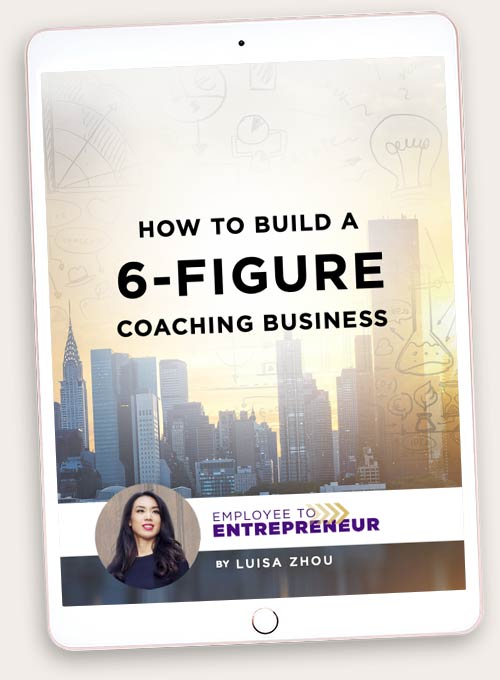
Want to Build a 6-Figure Coaching Business So You Can Achieve More Freedom?
Get Instant Access To My FREE Ultimate Guide Below!
When you sign up, you’ll also receive regular updates on building a successful online business.
What is a relationship coaching business?
More people than ever are turning to coaches (the coaching industry is a rapidly growing, $2 billion industry). And for you, that means the chance to have a big impact by helping people improve their love life and relationships. What’s more, a coaching business offers pretty sweet benefits, like a chance to quit your 9-5 and create more freedom and flexibility in your life. (It’s what I call a Freedom Business.)
But what is relationship coaching? And who can become a relationship coach? That’s what we’ll look at next.
What does a relationship coach do?
What is relationship coaching?
Good question. A coaching business is essentially all about supporting people to reach a goal they have. And as a relationship coach, you help them find love or improve their existing relationships.
We’ll get to what a great coach looks like later on in this article, but for now, what you need to know is that the way you support your one-on-one coaching clients is through calls, emails, and potentially a Facebook group or similar.
People hire relationship coaches for different reasons:
Relationship coaching for singles
You can be a relationship coach who helps singles find love. Some niches within this niche are: coaching people to date online, coaching single men or women, coaching people who want to find love in their community (religion or similar), coaching LGBQT+, or coaching divorcees. (It all comes down to finding those who have the ability and willingness to pay.)
Relationship coaching for couples
Another great niche is coaching couples — people who maybe need some help with getting back on track with their relationship.
Family relationship coaching
And finally, relationship coaching isn’t always about finding love. You can also become a relationship coach who helps people improve other relationships, such as with their family.
Irrespective of your niche, your job is to coach people to understand their goals, support them when they face challenges, help them rewrite old mindset blocks and internal beliefs that keep them stuck, and show them when they’re repeating the same old patterns that have been blocking them for so long.
So as you can see, you’re a mentor or guide to your clients. And thanks to your coaching, your students are far likelier to reach their goals. In fact, research shows that support helps people achieve them more effectively.
That’s what a dating coach does. But who can become a dating coach? And do you need a degree, certification, or relationship coach training to qualify as a coach?
What does it take to be a relationship coach?
Look:
There’s a common misconception that you have to go through a relationship coaching certification program to become a qualified relationship coach.
This is not the case. (Caveat: There are some niches where you do need to be a certified coach. And if you offer therapy or deal with mental health issues, then obviously you need to be a qualified therapist.)
But coaching is not therapy. Coaching is about supporting and mentoring people. The thing is: You don’t even compete with therapists because you don’t offer the same service.
That’s why, if you have results in your niche, you can start coaching. For example, my student Ruby Lee started her own relationship coaching business after years of working for companies like eHarmony — without a certification. Ruby also has a background in therapy, which she says helps in this type of business.
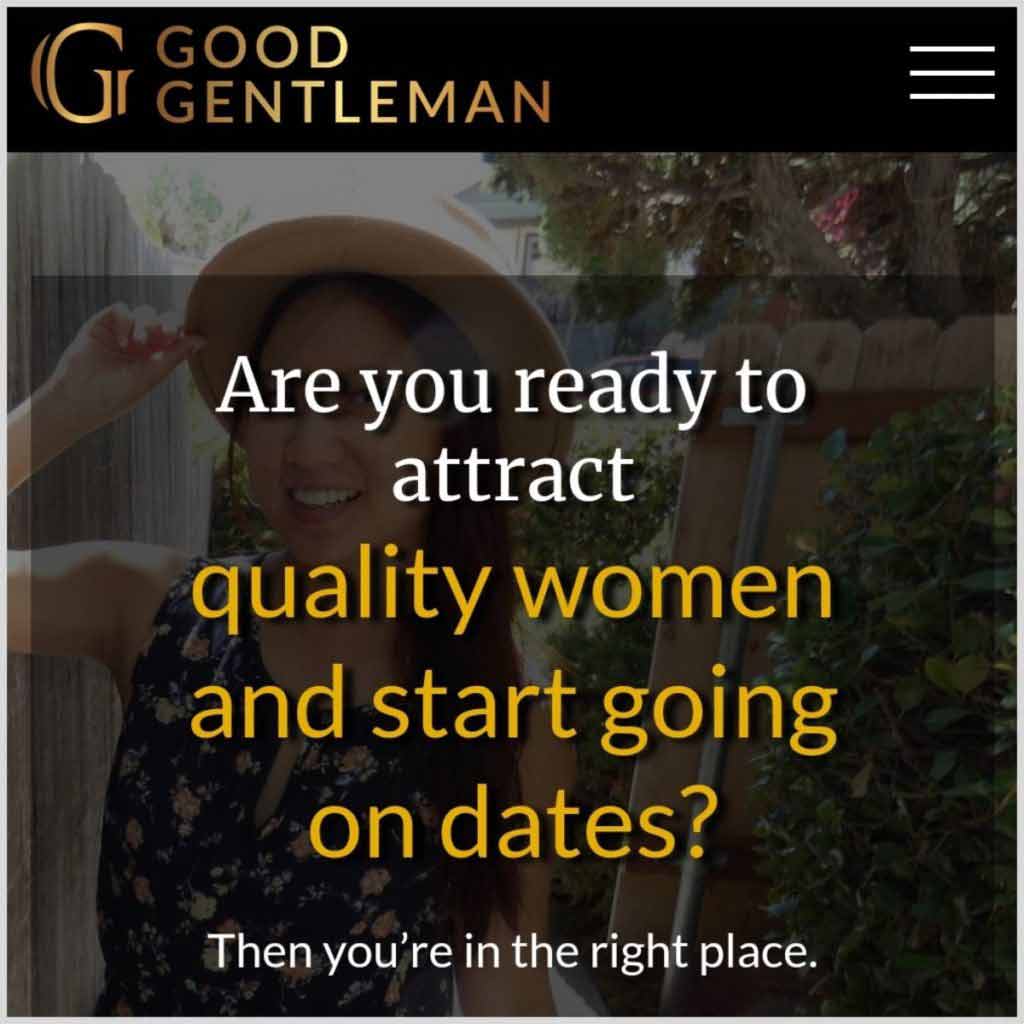
Briana, another of my students, is a creative arts therapist. In her niche (attachment in adult relationships), her experience matters, but a certification does not.
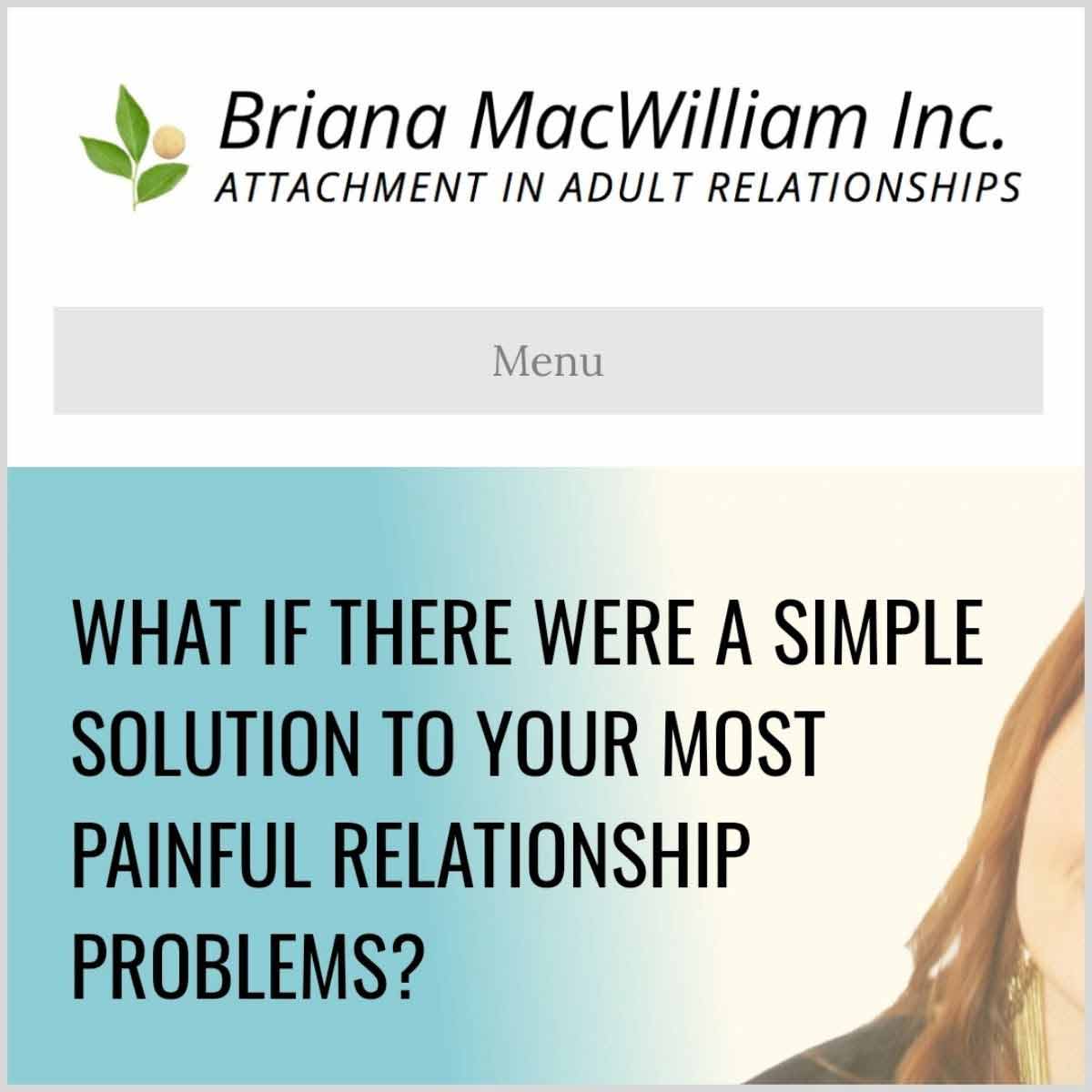
Or maybe you’ve gone through a divorce, thrived, and helped people around you do the same and now you want to start coaching people who are going through that process.
Granted, you won’t be an amazing relationship coach from day one. That’s why you offer lower rates in the beginning so that you can yourself develop your coaching skills as you coach more and more people.
How much money do relationship coaches make?
One of the first things new coaches tend to ask me is, “How much can I make as a coach?”
There’s no standard relationship coach salary. You and your results are the deciding factors.
If you can show amazing results to new clients, it’s much likelier that they’ll sign up and want to pay you top dollars.
I also recommend new coaches to start with a lower fee and work their way up as they establish their businesses.
A good rule of thumb is to start at $1,500 for a three-month package ($500/month) and then move on to higher relationship coach fees.
Once you have that credibility, you can start looking at rates of $3,000, $4,000, $5,000, and more.
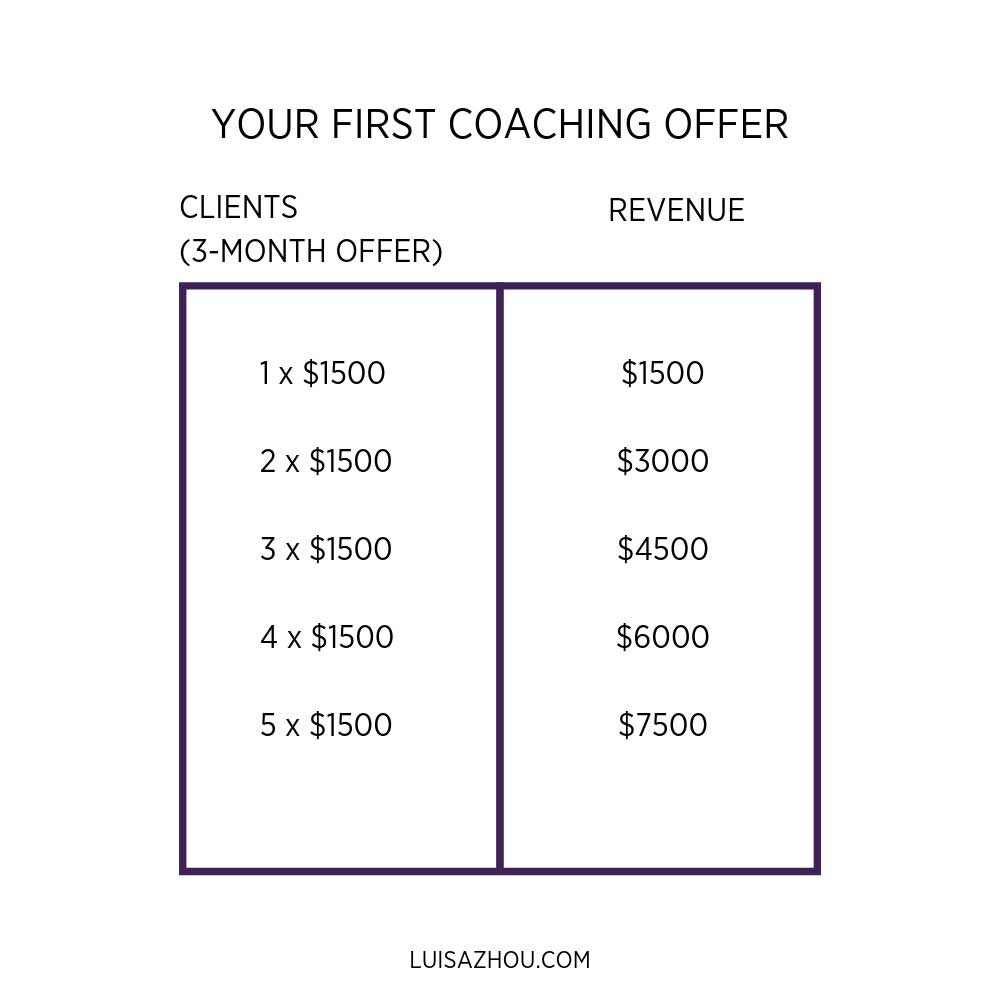
How to become a relationship coach online
Now you know what a relationship coach does. But how do you start your coaching business and how can you start it online? Here, you learn how my student Ruby started her business, how you can do the same, and how to become a great coach.
Start a dating coaching business
Listen:
Starting a relationship coach business can feel like a pipedream right now. But it doesn’t have to be.
That’s what my client Ruby of Good Gentleman found out when she was researching different options that would allow her to quit her 9-5.
Here you can watch my full interview with Ruby:
At the time, Ruby was in a day job as a matchmaker at eHarmony. She knew she wanted more. She wanted to be her own boss, help people, and work with a certain type of audience.
But she was held back by the uncertainty of it all.
First, Ruby felt that as she didn’t offer a tangible result (like earning money), but instead a very intangible result (finding love), she was scared her business wouldn’t work.
What’s more, the uncertainty of running a business felt intimidating. Not knowing when and how much she would earn every month was something that felt like a huge roadblock.
And finally, she wasn’t sure how she could find people who would be happy to pay her for her services.
But in a couple of months after joining my program, Employee to Entrepreneur, Ruby had her first sale of $2,000.
“Shortly after joining the program, I made my first sale and that was just doing research. That’s the crazy part! It was during an interview that a guy said, “This sounds good, I’ll do it.” And that’s when I realized, this is a business,” she says.
Over the next six months, she got 2 more clients and made $10,000. That’s when Ruby knew she would be able to leave her job very quickly.
Today? Her business makes multiple six figures and she loves working with her high-end, one-on-one clients and hearing her clients get life-changing results.
“Just the other day, I had someone say, “I’m in a relationship and I can’t believe it. I‘ve never had a relationship before.” That’s so exciting to me!”
The thing is:
Ruby followed a set formula and that’s how she was able to grow her business to the point where it is now.
She’s no exception (I’ve helped over 1,000 coaches start their businesses).
And neither are you—becoming a relationship coach is not a pipedream and it is so possible for you too.
The first step? Figure out what your offer is.

Want to Build a 6-Figure Coaching Business So You Can Achieve More Freedom?
Get Instant Access To My FREE Ultimate Guide Below!
When you sign up, you’ll also receive regular updates on building a successful online business.
Find an irresistible offer
First, you need to figure out your niche within your niche.
What do I mean by that?
You need a compelling offer that makes you stand out.
If you say, “I sell relationship coaching,” few people will listen.
But if you say, “I help busy women find their dream partner,” people are much likelier to pay attention.
In this short video, I talk more about figuring out your niche:
Set up your coaching business
The next thing on your to-do list is to set up a business.
This is the easy part so don’t spend too much time on it.
Find a relationship coaching business name
First:
Choose a business name! This is actually not that complicated.
You don’t even need a business name when you’re just starting out. And even when you set up your website, I recommend that you use your own name (www.yourname.com).
That said, if you want to find a different business name, you can use the Shopify Business Name Generator to get more ideas.
Don’t (!!) start your relationship coach website
Most new business owners think they need a website as the first thing when they start their businesses.
But that means you’re not focusing on the things that will get you the fastest results.
You see, as a new coach, people don’t know about you. So they won’t find your website or even check it out.
I launched my own business website when I had made around $20,000 in my business.
Before that, if people wanted to take a look at my website, I sent them a link to my LinkedIn profile. (It works just as well.)
Set up the relationship coaching tools that you need
Last, you need a few tools to get started. (But probably not as many as you might think.)
I actually recommend just a few tools for new coaches:
- Calendly. This scheduling tool makes it easy to set up sales calls with potential clients. Just send them a link to your calendar and Calendly takes care of the rest.
- Zoom. Zoom is my go-to for sales calls and coaching calls. That said, another, similar tool, like Skype, will work just as well.
- HelloSign. Once you’ve landed your first client, the first step is to send them a contract. HelloSign makes this an easy process. (Read my full guide on creating coaching contracts here.)
- Stripe. You’ll also want to get paid. Enter: Stripe. Send invoices and set up subscriptions with this tool.
- Google Drive. When you’re coaching people, you might need a place to store coaching material and share it with your clients. Google Drive is a free tool that works great for this purpose.
Become a top relationship coach
Now, something a lot of students will ask me is this:
“Luisa, how do I help my clients to succeed?”
Yes, it’s scary to help people achieve their dreams and goals. But because you already have experience and results in your niche, you have absolutely nothing to be worried about.
That said though, coaching is a skill you learn the more you do it.
Some people think that coaching is all about supporting clients to find their own answers.
They’ll say things like, “Ask questions and listen. Your student has the answer within themselves.”
While there’s some merit to this thinking, I don’t fully agree. I like to think of coaching as “coach-sulting,” so a mix of coaching and consulting.
What this comes down to is that you step up as a leader, provide a vision for your students, guide them, help them problem solve, and hold them accountable.
And as you develop as a coach, you’ll come up with your own relationship coaching techniques that make YOUR methodology so unique.
Want to learn more about how to coach people to succeed?
Here’s my full step-by-step guide on how to hold great coaching sessions.
Now you know how to set up your business. But how do you get your first client? And grow it? That’s what we’ll look at next.
Grow your relationship coaching business
We’ve come to the final step:
How to grow your business, aka. how to get your first paying clients and ultimately scale it profitably.
Let’s start with that first step you should be focusing on right now: Finding your first client.
Get your first client
Your first goal should be simple:
To get just one client.
Once you’ve achieved that goal, you can move on to the next one — getting three clients or more.
The biggest mistake you can make here is to instantly aim for six-figures, if you’ve never had any clients before.
Believe me, I know how tempting it can be.
When I look back at one of my early business goals, it reads:
“I want to make $30,000 by the end of this month.”
…I wrote this back when I hadn’t yet made a single dollar in my business.
While I love ambitious goals, too ambitious goals will keep you stuck.
That’s why we start with one client and then move on to bigger goals.
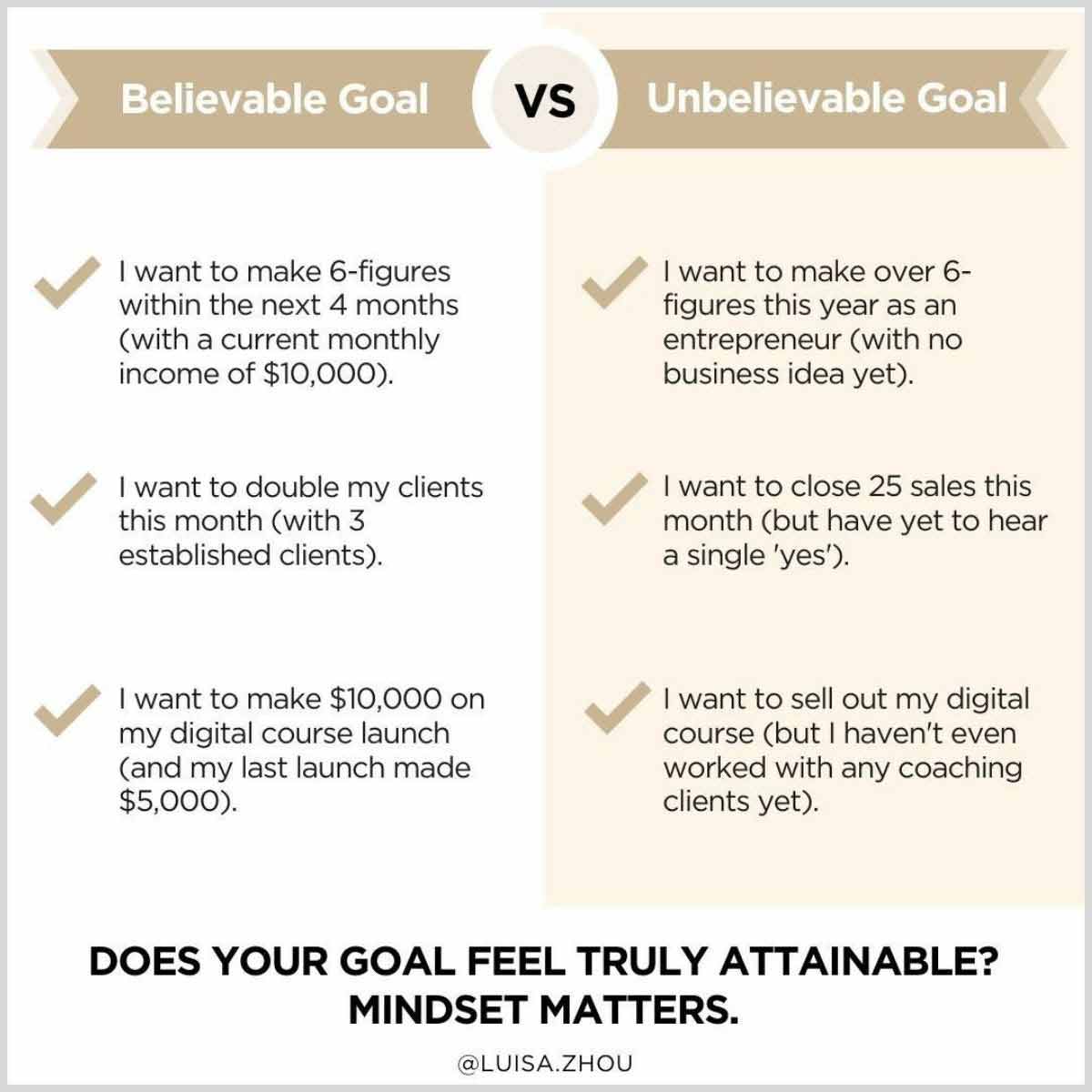
Getting your first relationship coaching client – Proactively find your client (step #1)
That said, how do you get that first client?
The first step:
Go to your clients and proactively offer your services. (This is where you need to hustle a bit.)
You can do this in a few different ways.
For example, some of my students have gotten clients by reaching out to their own network. Or they’ve pitched their services to people in their audience. They’ve also asked for referrals from friends to get new clients.
Getting your first relationship coaching client – Let your clients come to you (#2)
The first step is to proactively find clients. But you don’t have to solely rely on this one strategy to get your first client.
You can also let your clients come to you.
Here’s how you do it:
Brainstorm and go to where your clients are online.
Are they on Instagram? Facebook? YouTube? Reading a blog or listening to a podcast?
Think about how you can get in front of them on that platform.
For example, Ruby knew who her audience was — smart guys who were a bit on the nerdier side.
And she knew they hung out on Reddit, so that’s where she went.
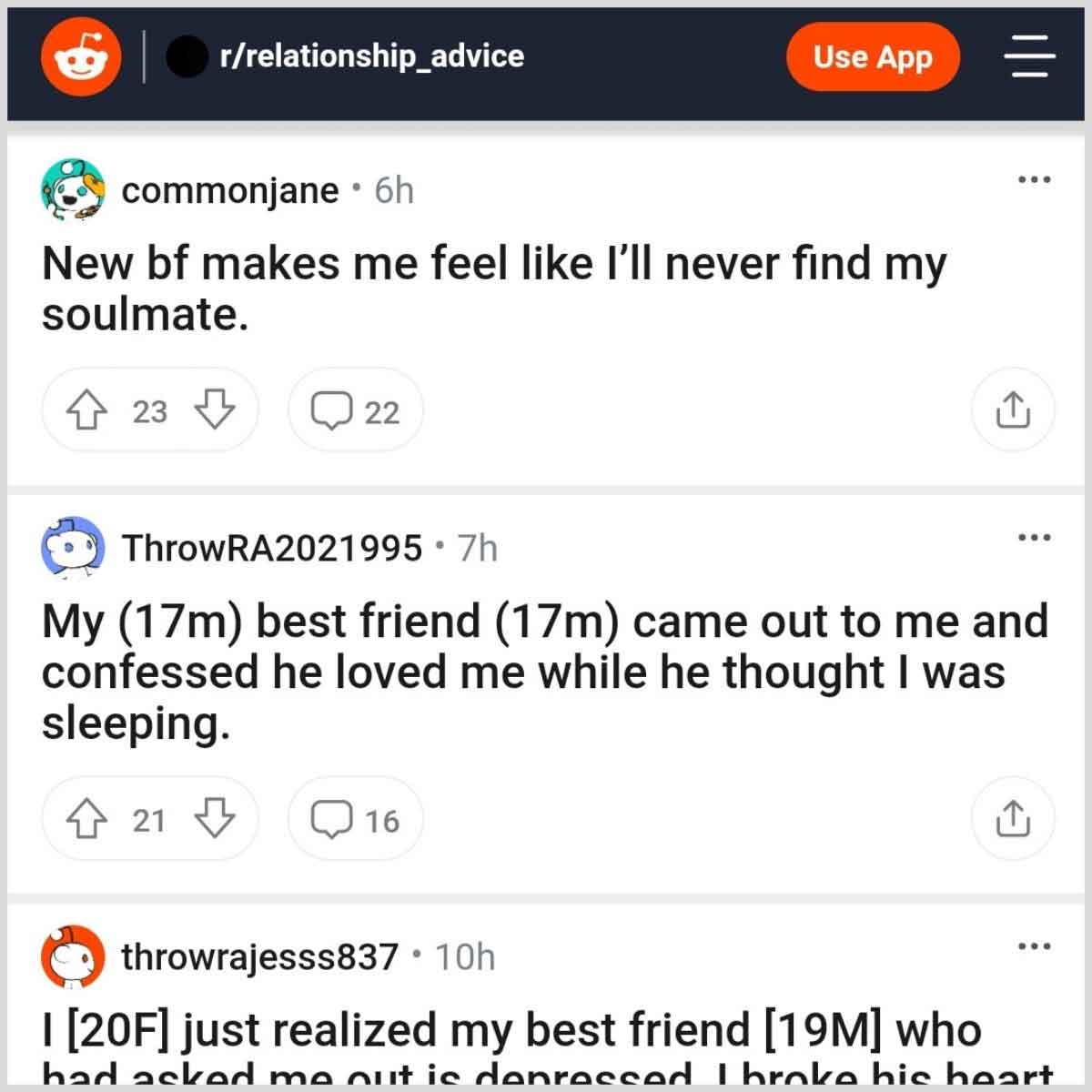
She posted a simple post that essentially said, “Hey! I’m a matchmaker in my job and I’m trying to see if I can build a business around it. If you are (this is where Ruby included a description of her ideal clients), I would really appreciate it if you could give a bit of your time for some market research questions. In return, I’m happy to give you a short, free coaching session where I’ll help you identify the top 3 reasons you always get friend-zoned.”
Around 10 people said yes. And this is where she used the Taster Technique by giving the guys a free coaching call (the call is a bit like an appetizer before the big meal).
At the end of the call, she asked them, “How was this? If you want my help to find the love of your life, I would love to work with you in a paid capacity. Would you be interested?”
One of the guys said yes, and that’s how Ruby got her first $2,000 client within two weeks after starting her business!
In the same way, you should start building engagement with your audience on the platform of your choice.
You see, people don’t trust you that easily if they’ve never come across you before.
But with content, you can build that trust faster. I like to say that you’re building your “trust bank.”
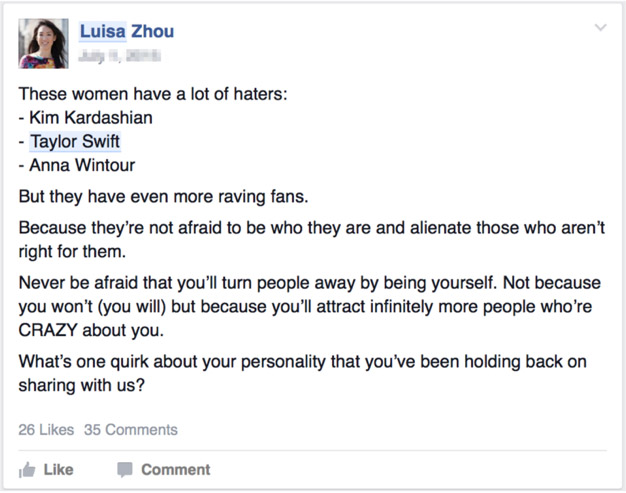
You essentially share your expertise and get in front of people. When they see your name popping up in their feeds (and if your content is compelling), they’ll become intrigued to read on.
By consistently sharing your content and answering people’s questions, you build engagement.
(If you’re pitching podcasts or guest blogs, then the process is to pitch many different publications and build up your trust bank that way.)
If you want even more ideas, take a look at this quick video where I share the 4 top ways to get your first client:
And once you have one client, you’re ready to get your next few clients with the same strategies.
But while getting your business off the ground is a bit of a hustle, you probably don’t want to put in all that work forever… And fortunately, you don’t have to.
You can grow your business profitably, without the hustle. That’s what we’ll look at next.
Grow your business
Almost all coaches will face the same problem:
You only have so much time to work with private coaching clients.
What do you do when your time is maxed out, which happens pretty much when you’ve taken on 10 clients?
That’s when you move on to other offers.
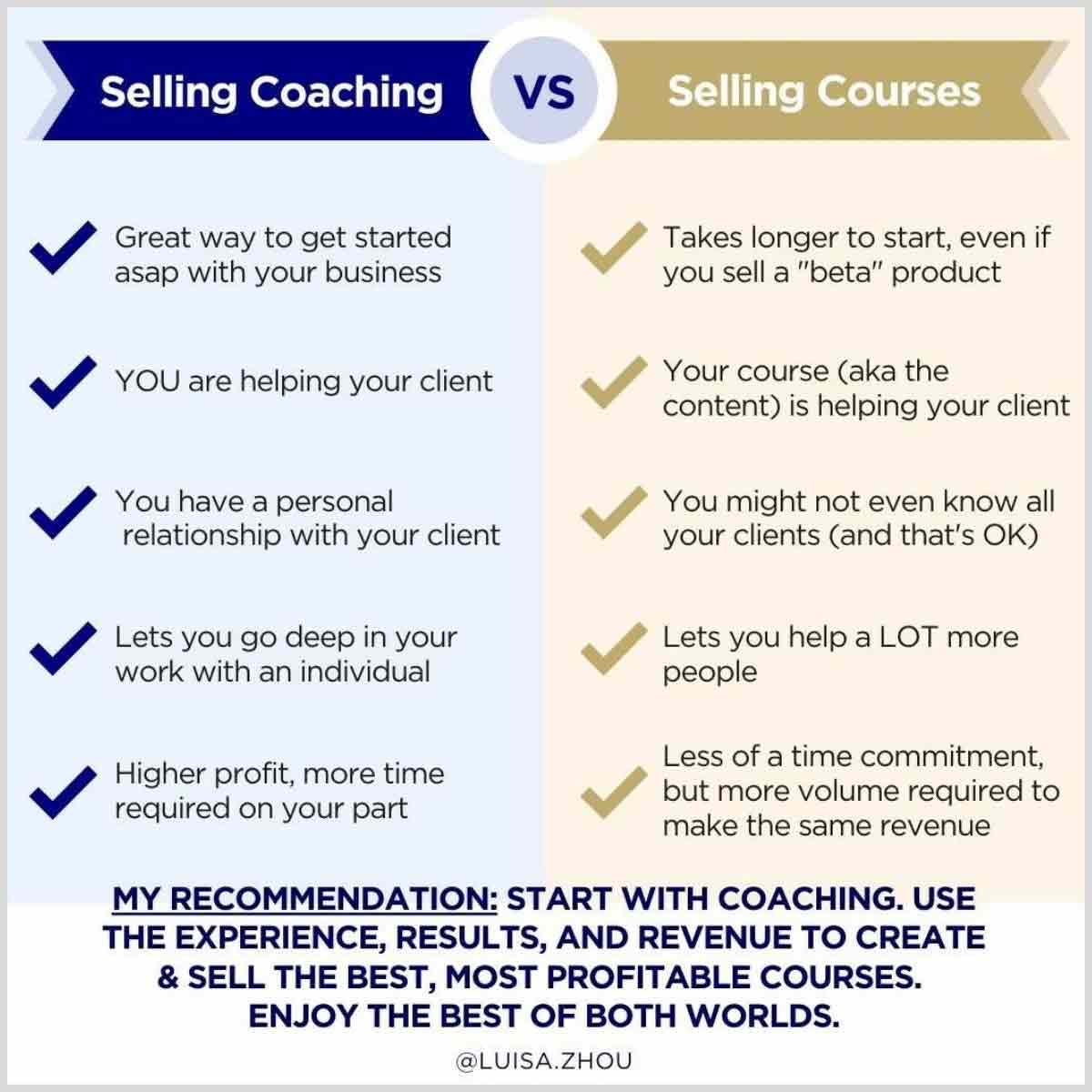
Ruby, the relationship coach, did just that.
She launched an online course to diversify her income sources.
That’s how she was able to move to multiple six figures in her business.
A course is a great way to sell something that you’ve created once and see your profits stack on. And creating it is really straightforward — you take what you teach your clients in your private coaching program and work that into an online course. You’ll notice that most people run into the same types of challenges and problems, so you can include them all in your self-study course.
Another idea for scaling your business is group relationship coaching.
This is when you take your coaching offer and open it up to a group of clients. All your coaching calls are group calls and you support your clients in a shared community, such as a Facebook group.
The best part is:
You help more people while making more money and leveraging your time. Win-win!
Next steps
There you have it. Now you know how to become a relationship coach.
What it comes down to is that you take that decision to get started and take consistent steps to get your first paying clients. That’s how you ultimately get to the point where you can hand in your resignation letter and become a full-time coach.
However, building a profitable and sustainable business comes down to a few things…
Want to know what they are?
Get my free blueprint that shows you exactly how to build a six-figure coaching business.

Want to Build a 6-Figure Coaching Business So You Can Achieve More Freedom?
Get Instant Access To My FREE Ultimate Guide Below!
When you sign up, you’ll also receive regular updates on building a successful online business.
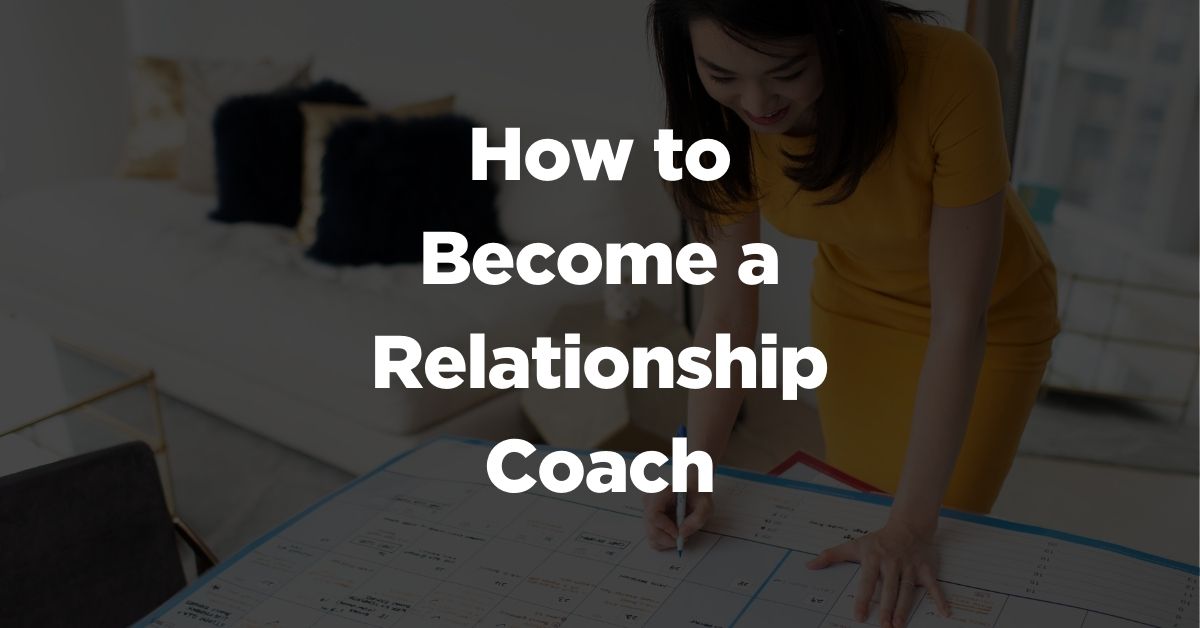




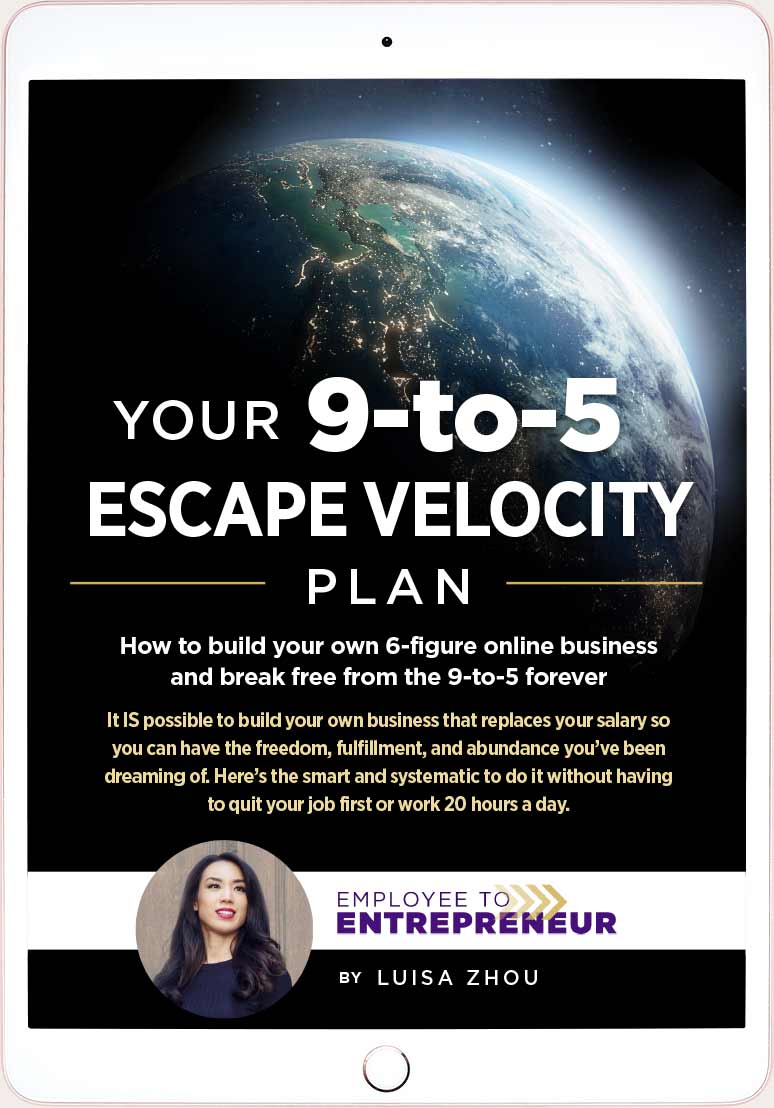



7 Responses
Great information made me think on how to taylor my business and get my 1st client.
Thanks for this eye opener message
am starting right away
so interesting and educative
Glad you found it helpful!
Just the information I’ve been searching for. My personal niche is dating and self confidence to get what you want out of a relationship.
Thank you!
Karen
This was just the motivation and insight I needed to scale my business. I started my relationship coaching and life coaching for women business in 2017. All of my business has been referral business and I needed to learn how to scale it as most of my clients are doing well now and I need to generate more business. I have a Master of Science degree in Family Life which has been beneficial for validating my services to my clients initially; however, my actual coaching comes mostly from my life’s experiences, which is far better and adds more value to others than textbook knowledge. Thank you for a wonderful read! I have taken copious notes and am now ready to execute.
Wow! Thank you for the detailed information. I have come across other “How to become a profitable coaching business” that proved far less
Information: leaving me scratching my head and leaving me with unanswered questions. Your candor and willingness to spread the wealth is humbling. I am a Licensed Professional Counselor in private practice. I have recently decided to start a coaching business and find that I was overthinking what I needed to do to get started. Reading your article has provided clarity and focus. I feel confident that I know what my niche is and how to advertise my services. Being in private practice is limiting; as I only get paid when clients show up and I am at the mercy of the insurance companies low rate payouts. Thank you, Luisa. You have given me hope!
So happy to hear you’re feeling hopeful + found this helpful! Wishing you all the best! ❤️